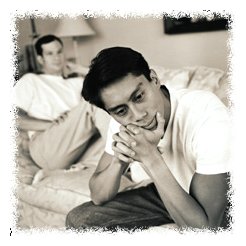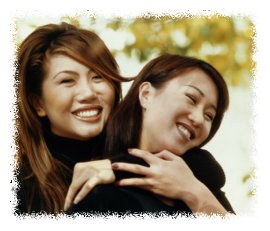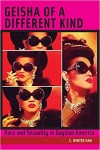Asian Americans who are lesbian, gay, bisexual, or transgender (LGBT) frequently face a double or even triple jeopardy -- being targets of prejudice and discrimination because of their ethnicity, gender, and sexual orientation. The following is an article entitled "Young, Gay, and APA," originally published in the July 17, 1999 issue of AsianWeek Magazine, written by Joyce Nishioka. It captures many of the obstacles and challenges that LGBT Asian Americans go through as they search for acceptance and happiness with the multiple forms of their personal identities.
Double Jeopardy
Nineteen-year-old Eric Aquino remembers a day not that long ago when he kneeled down to tie his shoe during P.E. class. He looked up to find a boy towering over him, saying, "That's where you belong" and making a comment about oral sex. "People teased me because they perceived me as a gay, fag queer," he remembers. "What could I do but ignore it? One thing I always did was ignore it."
While feelings of rejection and questions about "being normal" haunt most adolescents, they often hit harder at those who are minorities, either racial or sexual. And too often, those are the kids who get the least support. A 1989 study from the Department of Health and Human Services found that a gay teen who comes out to his or her parents faced about a 50-50 chance of being rejected and 1 in 4 had to leave home. Ten years later, a study in The Archives of Pediatric and Adolescent Medicine found that gay and bisexual teens are more than three times as likely to attempt suicide as other youths.

Surveys indicate that 80 percent of gay students do not feel safe in schools, and one poll by the Centers for Disease Control and Prevention showed 1 in 13 high school students had been attacked or harassed because they were perceived to be homosexual. Nationwide, 18 percent of all gay students are physically injured to the point they require medical treatment, and they are seven times as likely as their straight peers to be threatened with a weapon at school, according to the Gay, Lesbian and Straight Education Network.
Protecting homosexual Asian teens from discrimination requires double-duty measures, advocates say. Ofie Virtucio, a coordinator for AQUA, San Francisco's only citywide organization for gay Asian American teenagers (now known as the API Wellness Center), maintains that they are especially likely to be closeted and ignored. "Asians are the model minorities," she says, describing a common stereotype. "They can't be gay or at risk; they don't commit suicide or self-mutilate." In reality, Kim says, "There are many API youths in the California public school system who are gay or perceived as being gay and face angry discrimination and harassment. And there is nothing to adequately protect them."
As Kwok and thousands of others might attest, to be young, gay and APA is to simultaneously confront the ugly specters of barriers and discrimination that come with being gay in America and those that come with being Asian in America. "With the anti-Asian sentiment, students are harassed more for being Asian because it's more visible than sexuality." says San Francisco school district counselor Crystal Jang.
The Closet is a Lonely Place to Live
"People don't think there are API gays and lesbians," Virtucio says. "There is hardly any research, and no money goes to them." Consequently, no one knows precisely how many of San Francisco's Asian American children are gay. But if the often quoted figure of 10 percent of a population holds, the figure could exceed 1,300 in the public junior high and high schools alone. Asian American students, says Jang, account for about 90 percent of the kids she sees through the district's Support Services for Sexual Minorities Youth Program. Though there are more support groups for gay youths than ever before, Virtucio said many Asian American teens find it difficult to fit in. Nor do they have any role models. This decade's most noted gays and lesbians -- actresses Ellen DeGeneres and Anne Heche, Ambassador James Hormel and former Wisconsin congressman Steve Gunderson, Migden and Kuehl -- are all white, and so is society's perception of gay America.
"They can't go to programs for queer gay youths when no one speaks their language," Virtucio says. "How can they be understood when they talk about their close-knit family they can never come out to? They need to see people like them. Even if it's just serving rice, they need something familiar so they could [relate] and feel like they could be part of this community," says Virtucio, who touts her four-year-old group as "a channel to come out." In the summer, 20 to 30 teens -- half of whom are immigrants -- go to AQUA's weekly drop-in sessions. Though the group initially attracted mostly college-age men, most of its members today are younger, and half are female. At a recent get-together, the girls seemed much less vocal than boys, and though several young men agreed to be interviewed, no girls did. Jang explains that girls are more likely than boys to refrain from expressing their sexuality, possibly because of the shame they think they may bring on themselves and their families. One girl, she recalled, fell in love with her godsister and wanted to tell her, but she was afraid that if she did, everyone in Chinatown would find out.

For both genders, though, coming out to family and friends is a huge issue, one that Virtucio says cannot be put off indefinitely. "Parents want to know," she said, adding that many AQUA members have told her that they suspected that their parents knew about their sexuality long before their children would admit it to themselves. Mothers, she said, might ask daughters questions like, "Why to you dress that way? Wear a skirt." Or they might tell their sons, "Don't walk like that." At the same time, she said, cultural pressures to put the family first or to hide one's feelings often convince Asian and Asian American youth to internalize their sexuality. Each family member often is expected to fill an explicit role. For example, she explained, a Filipina, particularly the first-born daughter, "is supposed to take care of the family, and get married and have kids." A first-born Chinese son, she added, "can never be gay. He is supposed to extend the family name."
Desmond Kwok says his parents accept his sexual orientation -- though they don't necessarily support him emotionally. He acknowledges an ongoing "starvation for love" that he blames on his parents. Both have been distant, he says, especially his father, a businessman who lives in Chicago. Kwok says he found support for coming out not from his family, but from a gang he was in two years ago. "They were really cool with it, and it boosted my confidence in the whole coming-out process," he said. "They'd say, 'If someone has a grudge against you for being gay, we're there for you. We'll kick their asses.' "
Now, Kwok dates "older" Asian and Asian American men -- at least 19 -- because few come out before then, he says. He admits that he has tried to find boyfriends over the Internet, at bars and cafes, "the worst places to meet a good boyfriend. A graduate of the School of the Arts, a magnet academy, Kwok said he intends to continue his work as an advocate for gay Asian and Asian American teens. Yet even now he cannot rid "the feeling of being alone -- being around people who really love you, but still knowing they are heterosexual. They'll be with their girlfriends or boyfriends, and here I am all alone, sitting around, boo-hoo, no boyfriend."
'Straight' Into Isolation, 'Out' Into Happiness
Eric Aquino never had such peer support growing up in Vallejo, Calif., and especially in junior high school. "I felt alone," Aquino said. He avoided his locker, where the popular kids hung out, and instead took long, circuitous paths to classes to dodge their cruel comments. "A good day for me was being able to walk down the hall without having anyone ask, 'Are you gay? Do you suck dick?' His grades fell. "I would be late to class and wouldn't bring my books," he explained. "I couldn't concentrate. I looked at the clock until it was 3 o'clock and time to go."
Aquino's high school years were both the happiest and one of the most depressing times of his life. He joined marching band and had friends for the first time, but he also started feeling that he was, in fact, gay. "Friends were important to me because I never had any, but they didn't know me for what I was," he said. Aquino thought perhaps he should wait until he was 18 to come out, so that if his parents rejected him, he could run away. He also considered living in the closet and spent much of his time thinking of ways to keep his secret. "I thought of different alternatives, other options. Like, I'll get married and have kids, [then divorce] and be a single parent, and my parents would just think I never found love again.
|
Another Perspective Once gay/lesbian Asian Americans come out of the closet, do they find more support and acceptance within the mainstream gay/lesbian community? Many do, but unfortunately, anti-Asian racism among the predominantly White gay/lesbian community still exists. For a closer look, read Edge, Boston's article "Gay Anti-Asian Prejudice Thrives On the Internet " and Gay.net's article "Gay Racism Comes Out." |
Ofie Virtucio, 21, can relate to the feeling of isolation. "Maybe it's the feeling where you know you're Asian but sometimes in situations you're embarrassed to be," she said. "That's where I was for a long time. Of course I was lonely." When she was 13 and still in the Philippines, she recalls, her mother asked her, "Tomboy ca ba?' -- are you gay? She looked me in the eyes; she was worried," Virtucio said. "I said, 'No!' " She wishes that her mom had replied, "Whatever you are, it's OK. I still love you, Ofie.' " Two years later, the family came to the United States. "I had to be white in a month," she recalled. "When I started talking, I had an American accent that I could use, so I could make friends," she said. "During senior year, I was in denial being Filipino and didn't talk about being gay. Most importantly, I had to get friends. I had to get to know what America is all about. I had to survive."
She recalled: "I was trying to be straight but didn't want to have sex. I didn't want a man's penis in me." Though she had a boyfriend in high school, she secretly had crushes on girls, especially the teenage lesbians who were "out." At the same time, she recalls, she "couldn't relate. They were more 'we're-here-we're-queer' ... I knew I was gay, but I thought, 'I'm not like that.' It made me think I could never be like that." So, she said, "When my friends would talk about cute guys, I would jump into the conversation. I thought, 'OK, I have to do this right now,' so I'd say things like, 'Oh, he's so cute.' "Then when I would go home, I'd be like ... oh," said Virtucio, covering her eyes with her palms. "It hurts. It really, really hurts."
Virtucio finally acknowledged her sexuality during her college years, "the happiest time in my life." At age 18, she found her first girlfriend and experienced her first kiss, but it took many more years before she felt truly comfortable about being a lesbian. "I knew it was going to be a hard life," she said. "I thought, 'How am I going to tell my siblings? How am I going to get a job? Am I going to be constrained to having only gay friends? What are people going to think of me? I thought people would know now -- just because I know I'm gay -- that they'll just see it."
Virtucio never had the opportunity to come out to her mother, who passed away when she was 15. But in college, she did tell her father. She remembers he was in the garden watering plants when he asked her, out of the blue, whether her girlfriend was more than a friend. Startled, Virtucio says she denied it, but later that day, she opened the door to his bedroom and said it was true. They took a walk on the beach after that. "He told me whatever made me happy was fine," Virtucio recalls. "My father used to be mean to my mom, pot-bellied, chauvinistic," she says. "But for some reason he found it in his heart to understand. That moment was amazing for me. I thought if my dad could understand, I really don't care what the world thinks. I'm just going to be the person I am."
[an error occurred while processing this directive]Author Citation
Copyright © 1999 by Joyce Nishioka and AsianWeek Magazine. Reprinted in accordance with Section 107 of the U.S. Copyright Act of 1976.
Suggested reference: Nishioka, Joyce and AsianWeek Magazine. 1999. "Young, Gay, and APA" Asian-Nation: The Landscape of Asian America. <http://www.asian-nation.org/gay.shtml> ().
Related Articles and Blog Posts
- Health & Wellness
- Women and Gender Issues
- National Asian & Pacific Islander HIV/AIDS Awareness Day
- Report on LGBT Asian Americans
- China Limiting Foreign Adoption to Gays
- George Takei Comes Out
- Outrage at Racist & Homophobic Details Magazine
[an error occurred while processing this directive]
